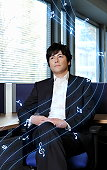
Home > Ear Training > Perfect Pitch For Pianists
|
||||
Perfect Pitch For Pianists
Imagine standing at a piano, randomly pounding your hands on the keys (like playing C, D, F, G, Ab, C#, and Eb – absolutely random), and a friend standing across the room says, “You’ve got C, D, F, G, Ab, C#, and Eb there.” Or if you play an A chord and they say, “You’ve got an A chord there.” You can even tell them, “Sing me an F# right now.” Then they sing a note, you play F#, and the tones match, perfectly. Usually in such cases, it is difficult to distinguish whether you’re feeling envy or awe. Regardless of what you’re feeling, it is fair to say that what you just witnessed was impressive. It is also fair to say that most people who have observed such feats believe that this is either a he’s-just-born-with-it talent, or some kind of superpower conferred by a mutant musical spider’s. Although it’s true that some individuals are born with this gifting, and although no one can confirm or deny the existence of super mutant musical spiders, another fact is that developing perfect pitch is actually something one can be trained to do. That’s right – if you don’t have perfect pitch today, you can soon with the right ear training for piano players. There’s more to perfect pitch for pianists than just impressing throngs of admirers at parties. Perfect pitch, also known as absolute pitch, means that one has the ability to recognize any given note without any sort of reference for aid.
Perfect pitch comes from just a strong memory – somehow, those with perfect pitch have committed different tones to memory and just do not forget them. It’s the audible of recognizing faces: just like you can remember your mother, father, brother, neighbor, and 7th grade math teacher without any problem, others can remember and identify tones. Even though you don’t have to practice learning your mother’s face (we hope), you will have to practice memorizing specific tones. This is a unique muscle in the memory that might not get exercise often, but if you’re interested in developing perfect pitch, then it’s time to dust it off and bring it to the tonal awareness gym. To improve your ability to memorize tones, there’s nothing you can really do except play a single note, like C, over and over again for days and days and days. Soon enough, you will learn to discern this note from others. Then try this same method for another note. Then another. Then another. This is a slow and often frustrating process – at times you may even feel like you’re making no progress at all – but like any type of memorization, with enough time and devotion it can be achieved. Perfect pitch for pianists is a useful skill that confers several advantages. However, one word of caution is that you must weigh the advantages against the opportunity cost it takes to obtain them. Considering how much time and attention is required to acquire perfect pitch, it might be more useful for you to devote yourself to mastering the knowledge of chords, progressions, scales, intervals, and so on. Impressive crowds with excellent playing rather than perfect pitch should be your goal. If you want to learn how to attain perfect pitch with a proven method, check out the Perfect Pitch Supercourse by David Lucas Burge which is renowned around to world to have high success rates amongst students.
| ||||
|
Although every attempt has been made to make information as accurate as possible, we are not responsible for any errors that may appear.
 “How did you do that?!” is frequently the response when someone
witnesses a person perfectly identify the notes they have just heard without looking at a piano.
“How did you do that?!” is frequently the response when someone
witnesses a person perfectly identify the notes they have just heard without looking at a piano.
 Many musicians, if given an “G” on the piano, could then correctly
identify any other note played by using the G as a reference and determining the interval between the G and
the mystery note. Those with perfect pitch don’t even need the G.
Many musicians, if given an “G” on the piano, could then correctly
identify any other note played by using the G as a reference and determining the interval between the G and
the mystery note. Those with perfect pitch don’t even need the G.


